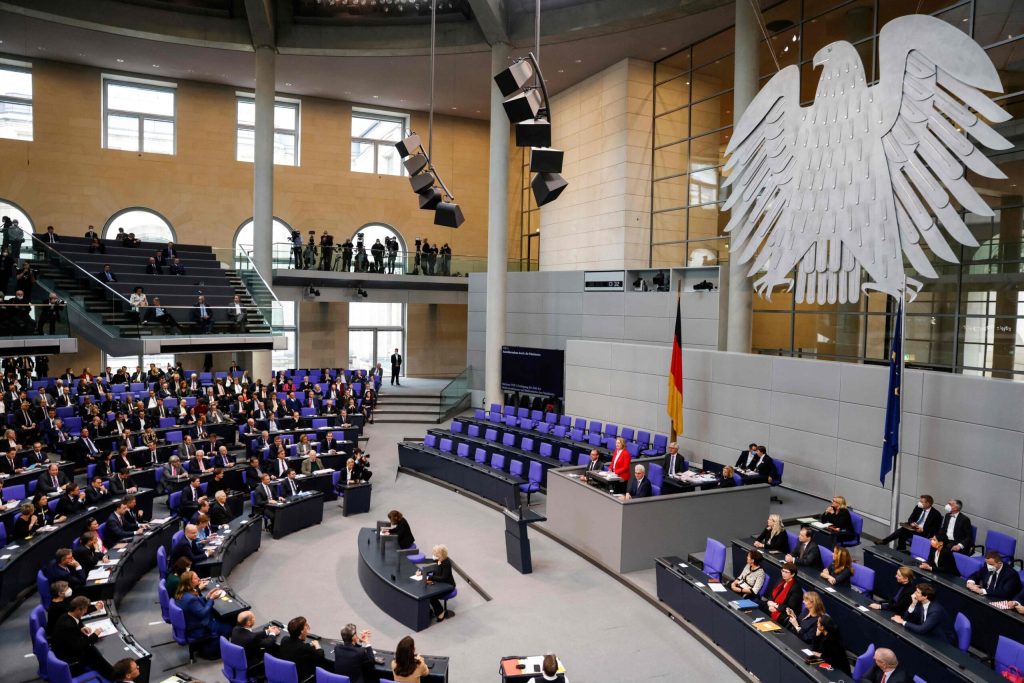Germany’s Far Right Grows in Influence in New Parliament

In the latest session of Germany’s newly elected parliament, the far-right party Alternative for Germany (AfD) made a significant impact by securing its largest share of seats. This marked a major moment in the Bundestag, as the AfD aimed to strengthen its influence during a period when Germany was facing serious diplomatic and economic challenges.
Following the election on February 23, the AfD claimed second place, its best result since World War II. The party’s growth has been fueled by the economic difficulties many Germans have been facing, along with the uncertainty created by Russia’s invasion of Ukraine.
At the start of the session, the AfD raised a challenge, pushing for its former leader, Alexander Gauland, to open the session as the “Father of the House,” a title that typically goes to the longest-serving member. This move directly opposed a rule change from 2017 that had been implemented to prevent an AfD member from assuming this role. Bernd Baumann, the AfD’s parliamentary leader, responded defiantly, saying, “Your tricks won’t stop our rise.”
The session also saw sharp exchanges, with Gregor Gysi—who has a long history in the Left party—criticizing AfD politician Stephan Brandner for using harsh language to describe the rejection of the AfD’s proposals by other parties. The AfD, which now holds 152 seats, has seen an influx of members with increasingly radical views.
Maximilian Krah, a new member of the European Parliament, recently prompted a backlash after failing to denounce the Nazi-era SS in an interview, leading far-right figures like Marine Le Pen to distance themselves from the AfD. However, Krah’s return to the party signaled its growing self-confidence, narrowing the gap between the AfD and the more conservative factions that had won the election.
The party also reinstated Mathias Helferich, a figure associated with the radical wing led by Bjoern Hoecke. Helferich had previously been excluded after controversial remarks, but the party’s shift to the far-right has only intensified since its formation in 2013. The AfD’s platform now includes nativist policies, opposition to Muslim immigration, support for Russia in the Ukraine conflict, and calls for the dissolution of the European Union.
The party has seen a rise in members with military backgrounds, some aligned with Hoecke’s faction and others with ties to the far-right NPD party. Among them is a high school history teacher.
Meanwhile, the Left party, which had struggled in recent years, also made a strong comeback in the new parliament, benefiting from growing discontent with economic stagnation and the handling of the Ukraine crisis, as well as concerns about the potential return of Donald Trump.
Though the AfD’s formal powers remain limited, the compromises made by conservative leader Friedrich Merz to secure support for a debt package from the Social Democrats and Greens have helped bolster the AfD’s position. Polls indicate the AfD is gaining ground, with only a slim majority of Merz’s supporters expressing confidence in his ability to effectively stand up to Trump. Julia Kloeckner, former agriculture minister and a conservative journalist, was elected president of the parliament and used her platform to rebuke the AfD’s accusations that mainstream political coalitions were part of a “cartel.” She stated, “Democratically-formed majorities are not cartels.”
With 24% of the seats in the 630-member parliament, the AfD’s presence was undeniable during the session. The party has been testing the political boundaries that have traditionally kept it isolated, with a recent court ruling allowing AfD members to join the parliamentary football team—suggesting the loosening of previous restrictions.
While many lawmakers continue to refuse to engage with the AfD, seeing it as undemocratic and anti-constitutional, a new generation of politicians advocates for a different approach. Ferat Kocak, the first Left party lawmaker to win a seat in former West Germany, has taken a more personal stance, noting that his disagreements with AfD members are political, not personal. He even shared a moment when he greeted an AfD member in an elevator with “Salam Alaykum.”
